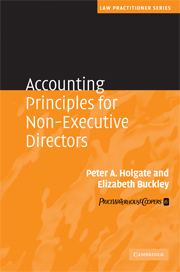Book contents
- Frontmatter
- Contents
- Acknowledgements
- Which standards and legislation has this book been based on?
- Glossary of terms
- Part I The accounting environment
- Part II Some specifics
- 8 Individual entity and consolidated financial statements
- 9 Presentation of financial statements
- 10 Earnings per share
- 11 Mergers and acquisitions
- 12 Interaction of accounting with tax
- 13 Assets
- 14 Liabilities
- 15 Leases
- 16 Pensions
- 17 Financial instruments
- 18 Share-based payment
- 19 Realised and distributable profits
- 20 Disclosures in published annual reports
- Appendices
- Index
12 - Interaction of accounting with tax
from Part II - Some specifics
Published online by Cambridge University Press: 02 November 2009
- Frontmatter
- Contents
- Acknowledgements
- Which standards and legislation has this book been based on?
- Glossary of terms
- Part I The accounting environment
- Part II Some specifics
- 8 Individual entity and consolidated financial statements
- 9 Presentation of financial statements
- 10 Earnings per share
- 11 Mergers and acquisitions
- 12 Interaction of accounting with tax
- 13 Assets
- 14 Liabilities
- 15 Leases
- 16 Pensions
- 17 Financial instruments
- 18 Share-based payment
- 19 Realised and distributable profits
- 20 Disclosures in published annual reports
- Appendices
- Index
Summary
Introduction
Company financial statements and corporate tax are closely related in a number of ways. First, although assessment of corporation tax is based on complex rules of tax law and practice, the starting point is the pre-tax profit shown in the company's annual statutory financial statements. Tax is levied at the entity, not consolidated, level so it is the individual company financial statements that are of relevance when preparing the tax computation. Second, financial statements need to reflect a company's obligations to pay tax. The most obvious example of this is the tax payable in respect of each year. However, in addition, accountants have developed accounting for ‘deferred tax’, the effect of which is that, generally, the tax effects of transactions are recognised in arriving at profit/loss in the same period that the transaction itself is recognised in arriving at profit/loss. Similarly so for other comprehensive income. Additionally, there is the question of how the move to IFRS at individual entity level affects tax assessment; although the group accounts of listed companies have now moved to IFRS, many individual entity accounts within those groups are still prepared using UK GAAP. These issues are discussed in turn. This chapter seeks to give an introductory guide to accounting aspects of the issues; it is not a guide to tax law or practice.
Accounting profit and its adjustment
Accounting profit – specifically, the profit before tax figure in the income statement/statement of comprehensive income – is the starting point for assessment of corporation tax. However, a number of adjustments are made.
- Type
- Chapter
- Information
- Accounting Principles for Non-Executive Directors , pp. 115 - 123Publisher: Cambridge University PressPrint publication year: 2009



